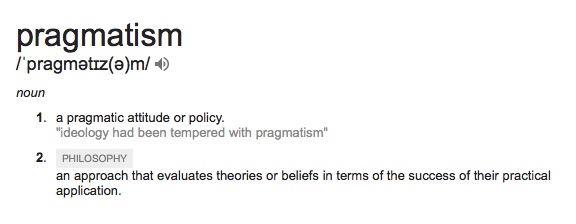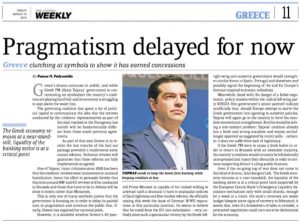Greece’s drama continues to unfold, and while Alexis Tsipras’s government is concentrating on symbolism the country’s creditors are playing hard ball and its economy is struggling to stay above water line.
The governing coalition has spent a lot of political capital to communicate the idea that the reviews conducted by the creditors’ representatives as part of the deal reached at the Eurogroup last month will be fundamentally different from those under previous agreements. As part of that deal Greece is to receive the last tranche of the bailout package provided it implements some crucial reforms. Technical reviews will guarantee that these reforms are fully implemented as agreed.
One of Tsipras’s main criticisms since 2010 has been that the creditors’ reviews were tantamount to national humiliation; hence his effort to persuade Greeks that this time around IMF and EU reviews will be conducted in Brussels and those that have to be in Athens will be done in hotels thather than Ministries.
This is only one of many symbolic points that the government is focusing on in order to delay its painful turn to pragmatism and convince the public that, finally, Greece has regained her national pride.
However, it is doubtful whether Greece’s 40-year-old Prime Minister is capable of (or indeed willing to attempt) such a dramatic U-turn to unpopular policies of fiscal tightness and free-market reforms. By officially raising this week the issue of German WWII reparations at this particular junction, he seems to believe that he could force the EU into submission — very unlikely since such a spectacular victory by the Greek left-right-wing anti-austerity government would strengthen similar forces in Spain, Portugal and elsewhere and possibly signal the beginning of the end for Europe’s German-inspired economic orthodoxy.
Meanwhile, faced with the danger of a failed negotiation, policy makers within the radical left-wing party SYRIZA (the government’s senior partner) indicate unofficially that, should Europe attempt to starve the Greek government into agreeing to austerity policies, Tsipras will again go to the country to have his mandate renewed and strengthened. But this would be solving a non-existent problem: Tsipras’s coalition already has a fresh and strong mandate and enjoys unchallenged approval as suggested by recent polls — certainly, it does not suffer from lack of legitimacy.
Even if the on-going tug of war does not culminate in drama, fatal dangers lurk.
If the Greek PM were to cause a fresh ballot in order to return to Brussels with an extended majority, the country’s creditors would certainly be left distinctly unimpressed and repeat their demands in order to continue supporting Greece’s ailing public finances.
Even if the on-going tug of war does not come to this kind of drama, fatal dangers lurk. The Greek economy remains at a near-standstill, the liquidity of the banking sector is at a critical point (and supported by the European Central Bank’s Emergency Liquidity Assistance mechanism only with small chunks, enough for a week at a time), the state’s revenues are under budget (despite some signs of recovery in February); it seems that, even if a breakdown of talks is avoided, a protracted negotiation could turn out to be detrimental for the economy.


![Krugman: If Tsipras accepts the dictates of the Troika, how is he different? [vid] Krugman: If Tsipras accepts the dictates of the Troika, how is he different? [vid]](https://serpico.gr/wp-content/uploads/2018/07/paul_krugman-2.png)


